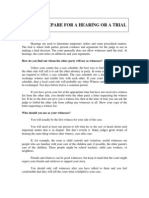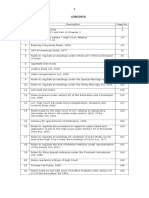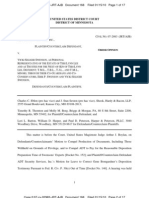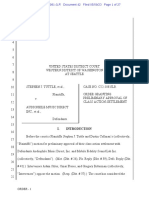"Trial Assignment": in Family Law Cases
"Trial Assignment": in Family Law Cases
Uploaded by
Ashish SinghCopyright:
Available Formats
"Trial Assignment": in Family Law Cases
"Trial Assignment": in Family Law Cases
Uploaded by
Ashish SinghOriginal Description:
Original Title
Copyright
Available Formats
Share this document
Did you find this document useful?
Is this content inappropriate?
Copyright:
Available Formats
"Trial Assignment": in Family Law Cases
"Trial Assignment": in Family Law Cases
Uploaded by
Ashish SinghCopyright:
Available Formats
“TRIAL ASSIGNMENT”
IN FAMILY LAW CASES
1. What is “Trial Assignment”?
“Trial Assignment” is a court proceeding in which a Judge decides which family law cases
scheduled for hearing the next court day are ready to proceed, how much time is needed for each hearing,
and which Judges have time available to hear those cases. The Trial Assignment Judge then assigns the
cases and tells the parties what courtroom the case will be heard the next day.
2. Where does Trial Assignment” happen?
The bulletin board in Room 211 of the courthouse always lists the name and courtroom # of the Judge
handling Trial Assignment for that particular day.
3. When does Trial Assignment happen?
Every court day starting at 9:00 a.m. Trial Assignment is usually finished by 9:15 or 9:20. It is very
important to be there on time so you are present when your case is called. Arrive early and allow plenty of
time to get through security in the lobby.
4. What happens at Trial Assignment?
All the attorneys and self-represented parties who have a case on the Trial Assignment docket take a seat
in the courtroom. The Judge comes out to the bench at 9:00 a.m. and announces each case on the
docket, one at a time. When your case is called, you will need to:
• Stand up and tell the Judge that you are there and what your name is
• Tell the Judge whether you are ready to have your hearing the next day
• If you’re not ready, tell the Judge the reason why. Also tell the Judge when you will be
ready. The other side might disagree with your request to set over the case, and in this
situation the Judge will decide what to do. It is always best to let the other side know as
soon as possible if you think you will not be ready for a scheduled hearing.
• If you are ready for your hearing, tell the Judge how much time you think you need. Take into
account whether you will have any witnesses coming to court with you and how long it will take for
you to tell your side of the story and have your witnesses provide their information to the Judge.
• Listen to the Judge make the assignments once all of the cases have been called. Remember to
write down the name of the Judge, the courtroom number, and the time of day your hearing is set
to start the next day.
Reminder: If you have children and (1) have not completed the parent education class or (2) have not
participated in Mediation or obtained a waiver of Mediation, you case could be set-over at Trial
Assignment. If you have questions about the Parent Education Class or Mediation, you can contact the
staff in Room 211 or the Family Court Services Dept in Room 350 (503/988-3189). Information is also
available on the court’s website. See the bottom of this page.
5. What happens if I don’t attend the Trial Assignment proceeding?
You could lose your chance to participate in the hearing the next day and therefore lose your case. You
must attend Trial Assignment in person if you do not have an attorney.
6. What should I bring with me to court for trial (or hearing) the next day?
• Any witnesses you think have information helpful to the Judge
• Any documents you think show information helpful to the Judge. (Please bring 3 copies – one for
you, one for the other side, and one for the Judge).
• If child or spousal support is an issue, you must complete a Uniform Support Declaration and
attach copies of paystubs and tax returns. You can get a copy of this form on the “Family Court”
website (see below) on the “Forms” page.
You can get more information about what to expect in a family law court hearing by reading the booklets
posted on the court’s website at: http://courts.oregon.gov/Multnomah. Click on “Family Court” under Quick
Links, and then the “Finding Legal Help” page. Other information helpful to you is available there.
You might also like
- Free Guide and Forms To Seal Your Texas Criminal Record (Nondisclosure)Document17 pagesFree Guide and Forms To Seal Your Texas Criminal Record (Nondisclosure)Michael Lowe, Attorney at Law86% (14)
- How To Use Discovery To Dismiss Any Court Case PDFDocument10 pagesHow To Use Discovery To Dismiss Any Court Case PDFMark Nolan80% (10)
- Unlawful Detainer Packet - RevisedDocument11 pagesUnlawful Detainer Packet - RevisedSuzana Popescu50% (2)
- Invoice PDFDocument2 pagesInvoice PDFAshish SinghNo ratings yet
- Requesting A Continuance For Court (Sample Letter) - OwlcationDocument7 pagesRequesting A Continuance For Court (Sample Letter) - OwlcationJuan VasquezNo ratings yet
- Deposition ObjectionsDocument13 pagesDeposition Objectionsabdulrehman786No ratings yet
- Petition For Protective Order PacketDocument9 pagesPetition For Protective Order PacketBleak NarrativesNo ratings yet
- Rowbotham Application BCDocument22 pagesRowbotham Application BCAndre Faust100% (1)
- Injunction Basics and Sample FormDocument7 pagesInjunction Basics and Sample FormJowi Su100% (3)
- Divorce Law Procedure QuestionsDocument4 pagesDivorce Law Procedure QuestionsEl Cheapo MitchellNo ratings yet
- How To Prepare For Your Contested Restraining Order HearingDocument15 pagesHow To Prepare For Your Contested Restraining Order HearingBIGBOY100% (1)
- Rcas Making An Application in Court of Queen 39 S Bench With An Application FormDocument23 pagesRcas Making An Application in Court of Queen 39 S Bench With An Application FormBrendan LaboucanNo ratings yet
- wage-recovery-hearingDocument10 pageswage-recovery-hearingPreet PatelNo ratings yet
- Guide Peace Bond enDocument4 pagesGuide Peace Bond enstephaniekenehan.xoxoNo ratings yet
- What To Expect SRL Bench Trial FINAL 0310Document22 pagesWhat To Expect SRL Bench Trial FINAL 0310HeyYoNo ratings yet
- Texto 9 - Criminal Procedure CanadaDocument6 pagesTexto 9 - Criminal Procedure CanadaAlejandro Nicolas Ramirez GuerraNo ratings yet
- 2019.06 Ilrc Help Immigration Court-EngDocument4 pages2019.06 Ilrc Help Immigration Court-EngGauravNo ratings yet
- When An Eviction Has Been Filed Against You 20210723Document7 pagesWhen An Eviction Has Been Filed Against You 20210723jaci92008No ratings yet
- Motion Packet General 2017Document14 pagesMotion Packet General 2017cmf318No ratings yet
- Small Claims Court _ NJ CourtsDocument16 pagesSmall Claims Court _ NJ Courtsepv190No ratings yet
- Coming To CourtDocument5 pagesComing To CourtShoiab Safdar GhummanNo ratings yet
- 2010 Duryee's SpeechDocument13 pages2010 Duryee's SpeechValerie R. HoughtonNo ratings yet
- Preparing For Court ProceedingsDocument2 pagesPreparing For Court ProceedingsDieudonne RurangirwaNo ratings yet
- Directions For Bringing A MotionDocument5 pagesDirections For Bringing A Motiontj5or8No ratings yet
- How To File For A Writ of PossessionDocument8 pagesHow To File For A Writ of PossessionLM100% (1)
- MigrationDocument12 pagesMigrationMahak KhillanNo ratings yet
- Response To A Motion Kit-1 NJDocument7 pagesResponse To A Motion Kit-1 NJLESLEY100% (1)
- How To File A Motion: (Superior Court of New Jersey - Law Division - Civil Part)Document10 pagesHow To File A Motion: (Superior Court of New Jersey - Law Division - Civil Part)Angela WigleyNo ratings yet
- Reminders IN Court Appearance: Atty. Jaydee Peregrino-CoDocument41 pagesReminders IN Court Appearance: Atty. Jaydee Peregrino-Cojd_prgrin_coNo ratings yet
- Jury Trial Jury Script Revised - TinDocument9 pagesJury Trial Jury Script Revised - TinPre ShantiNo ratings yet
- How one of my Pro-se cases got destroyed by federal rogue judgesFrom EverandHow one of my Pro-se cases got destroyed by federal rogue judgesNo ratings yet
- Gov Uscourts Ned 75750 145 0Document7 pagesGov Uscourts Ned 75750 145 0MrJonesWMNo ratings yet
- How To Prepare For Court BookletDocument4 pagesHow To Prepare For Court BookletautumngraceNo ratings yet
- Bench Trial HandookDocument18 pagesBench Trial HandookVirgelia Dumadag100% (4)
- UD Emergency Ex Parte For Motion To Set Aside Default Judgment How To GuideEnglishDocument17 pagesUD Emergency Ex Parte For Motion To Set Aside Default Judgment How To GuideEnglishDaisy Ibarra100% (2)
- Calendar Call Instructions-Small ClaimsDocument2 pagesCalendar Call Instructions-Small Claimstatidallmann252561No ratings yet
- Representing Yourself Before The Administrative Hearing CommissionDocument8 pagesRepresenting Yourself Before The Administrative Hearing CommissionRicharnellia-RichieRichBattiest-CollinsNo ratings yet
- Inglés II. Dos SesionesDocument21 pagesInglés II. Dos SesionesdcperezhNo ratings yet
- Trials, Basic Trial Procedure & Common Crimes: Civil CaseDocument18 pagesTrials, Basic Trial Procedure & Common Crimes: Civil CaseAtty GheNo ratings yet
- Motion For Contempt and EnforcementDocument5 pagesMotion For Contempt and EnforcementThomasNo ratings yet
- Oral ArguementDocument6 pagesOral ArguementWARWICKJNo ratings yet
- Court Observation Tech LogDocument8 pagesCourt Observation Tech LogymaguindraNo ratings yet
- Civil Process (Brief)Document21 pagesCivil Process (Brief)jamie jyNo ratings yet
- Simplified Steps in AnnulmentDocument2 pagesSimplified Steps in AnnulmentAlfons Janssen Alpoy Marcera100% (1)
- Response To A Motion KitDocument7 pagesResponse To A Motion KitKenneth SandersNo ratings yet
- Representing Yourself in Court: Some Things You Should Know AboutDocument4 pagesRepresenting Yourself in Court: Some Things You Should Know AboutRicharnellia-RichieRichBattiest-CollinsNo ratings yet
- Delegetes GuideeDocument9 pagesDelegetes Guideeapi-477944311No ratings yet
- About PTC CRDocument1 pageAbout PTC CRalibcc02No ratings yet
- Form FOC 109 Motion Regarding Payment Plan/Discharge of ArrearsDocument8 pagesForm FOC 109 Motion Regarding Payment Plan/Discharge of ArrearsMichelle HolfordNo ratings yet
- Defending Yourself in Criminal Court: Community Legal Information Association of Prince Edward Island, IncDocument9 pagesDefending Yourself in Criminal Court: Community Legal Information Association of Prince Edward Island, IncsudipNo ratings yet
- Checklist For A Bench Warrant or An Order To Show CauseDocument7 pagesChecklist For A Bench Warrant or An Order To Show CauseEugene Evan Endaya UyNo ratings yet
- Representing YourselfDocument3 pagesRepresenting Yourselfnishatj589No ratings yet
- Rywant, Alvarez, Jones, Russo & Guyton PADocument29 pagesRywant, Alvarez, Jones, Russo & Guyton PAjay gatzNo ratings yet
- Understanding The Guilty Plea Process - Criminal Defence Articles by Tushar K. PainDocument4 pagesUnderstanding The Guilty Plea Process - Criminal Defence Articles by Tushar K. PainEdgar Roberto AcostaNo ratings yet
- Pretrial - Doc 1Document2 pagesPretrial - Doc 1tass23No ratings yet
- Opp To Motion General Packet 2017Document12 pagesOpp To Motion General Packet 2017King FishNo ratings yet
- Guide To Preparing For A Family Court Trial in Provincial CourtDocument22 pagesGuide To Preparing For A Family Court Trial in Provincial CourtTUP TutorsNo ratings yet
- Dr. Ram Manohar Lohiya National Law University, Lucknow 2017Document11 pagesDr. Ram Manohar Lohiya National Law University, Lucknow 2017vineetNo ratings yet
- A Paper On Court ObservationDocument8 pagesA Paper On Court Observationymaguindra100% (1)
- Divorce Guide Western Cape High Court Cape TownDocument3 pagesDivorce Guide Western Cape High Court Cape TownLorette100% (1)
- The Doctor and The CourtDocument43 pagesThe Doctor and The CourtzahariNo ratings yet
- Dr. Shakuntala Misra National Rehabilitation University LucknowDocument14 pagesDr. Shakuntala Misra National Rehabilitation University LucknowAshish SinghNo ratings yet
- Regina V ThorntonDocument13 pagesRegina V ThorntonAshish SinghNo ratings yet
- Eshan Banking LawDocument20 pagesEshan Banking LawAshish SinghNo ratings yet
- Corporate & Project FinanceDocument11 pagesCorporate & Project FinanceAshish SinghNo ratings yet
- 4 PDFDocument15 pages4 PDFAshish SinghNo ratings yet
- 7 Differences Between Constitutional & Administrative LawDocument4 pages7 Differences Between Constitutional & Administrative LawAshish SinghNo ratings yet
- International Taxation Emerging JurisprudenceDocument21 pagesInternational Taxation Emerging JurisprudenceAshish SinghNo ratings yet
- Direct Tax Study & Overview": Project Report On "Document28 pagesDirect Tax Study & Overview": Project Report On "Ashish SinghNo ratings yet
- International Law Status of The Right To Receive Asylum: An AnalysisDocument13 pagesInternational Law Status of The Right To Receive Asylum: An AnalysisAshish SinghNo ratings yet
- Manasi Banking Law AshishDocument22 pagesManasi Banking Law AshishAshish SinghNo ratings yet
- Dr. Shakuntala Misra National Rehabilitation University LucknowDocument11 pagesDr. Shakuntala Misra National Rehabilitation University LucknowAshish Singh100% (1)
- Dr. Shakuntala Misra National Rehabilitation University LucknowDocument3 pagesDr. Shakuntala Misra National Rehabilitation University LucknowAshish SinghNo ratings yet
- Dr. Shakuntala Misra National Rehabilitation University LucknowDocument14 pagesDr. Shakuntala Misra National Rehabilitation University LucknowAshish SinghNo ratings yet
- Competition Law: Banking & Financial Institutions & Environmental SafeguardsDocument15 pagesCompetition Law: Banking & Financial Institutions & Environmental SafeguardsAshish SinghNo ratings yet
- Concept of Succession and Inheritance Under Mitakshra Joint Hindu FamilyDocument17 pagesConcept of Succession and Inheritance Under Mitakshra Joint Hindu FamilyAshish SinghNo ratings yet
- Arrest by Private Person: Power and Procedure: Dr. Shakuntala Misra National Rehabilitation University, Lucknow inDocument9 pagesArrest by Private Person: Power and Procedure: Dr. Shakuntala Misra National Rehabilitation University, Lucknow inAshish SinghNo ratings yet
- O R (1) Regional IntegrationDocument21 pagesO R (1) Regional IntegrationAshish SinghNo ratings yet
- Banking & Financial Institutions & Environmental SafeguardsDocument15 pagesBanking & Financial Institutions & Environmental SafeguardsAshish SinghNo ratings yet
- CCI SynopsisDocument11 pagesCCI SynopsisAshish SinghNo ratings yet
- BrochureDocument22 pagesBrochureAshish SinghNo ratings yet
- What Is Combination?Document1 pageWhat Is Combination?Ashish SinghNo ratings yet
- Santos-Concio Et - Al vs. DojDocument8 pagesSantos-Concio Et - Al vs. DojWILHELMINA CUYUGANNo ratings yet
- Independence of JudiciaryDocument20 pagesIndependence of Judiciaryhappy mundraNo ratings yet
- Criminal Appeal 16 of 2019Document4 pagesCriminal Appeal 16 of 2019Kambura GodfreyNo ratings yet
- Rule 116Document2 pagesRule 116Treblif AdarojemNo ratings yet
- HR Habeas DataDocument10 pagesHR Habeas DatabunsopinkikayNo ratings yet
- Jurisprudence Cancellation or Correction of Entries in The Civil RegistryDocument81 pagesJurisprudence Cancellation or Correction of Entries in The Civil RegistryMa. Danice Angela Balde-Barcoma100% (1)
- The Kenya Chapter International Arbitration ReviewDocument26 pagesThe Kenya Chapter International Arbitration ReviewIbrahim Abdi AdanNo ratings yet
- CPC Final NotesDocument13 pagesCPC Final NotesShubham PrakashNo ratings yet
- Commercial Courts - IndoreDocument20 pagesCommercial Courts - IndoreDeeptanshu ShuklaNo ratings yet
- 11-Municipality of San Juan v. Court of AppealsDocument6 pages11-Municipality of San Juan v. Court of AppealsShane Marie CanonoNo ratings yet
- Aricles 29-35Document23 pagesAricles 29-35TinersNo ratings yet
- Rule 7 Civil ProcedureDocument7 pagesRule 7 Civil ProcedureMikee Angela PanopioNo ratings yet
- Clerku À Ast CT,: Ca Se NO.: Ii-Zoin - C Iw Seitz/Sm On Ton Traian BujduveanuDocument70 pagesClerku À Ast CT,: Ca Se NO.: Ii-Zoin - C Iw Seitz/Sm On Ton Traian BujduveanucinaripatNo ratings yet
- Gatchalian vs. Office of The Ombudsman (Full Text, Word Version)Document12 pagesGatchalian vs. Office of The Ombudsman (Full Text, Word Version)Emir MendozaNo ratings yet
- Abalos v. PeopleDocument6 pagesAbalos v. PeoplemepoNo ratings yet
- HC ManualDocument197 pagesHC Manualjairaj321No ratings yet
- Agueda V de VeraDocument10 pagesAgueda V de VeraDarkSlumberNo ratings yet
- SCC Re-Rewrites The Standard of Review - Insights - Torys LLPDocument5 pagesSCC Re-Rewrites The Standard of Review - Insights - Torys LLPnsv0881No ratings yet
- Forhan - CMBD Brief & MTN (Compel) - 2024 - XDocument38 pagesForhan - CMBD Brief & MTN (Compel) - 2024 - XElliot ForhanNo ratings yet
- Gashumba V NkudiyeDocument7 pagesGashumba V NkudiyeAshraf KiswiririNo ratings yet
- ADT V Seliger 1 - 15 - 09Document17 pagesADT V Seliger 1 - 15 - 09Seth LeventhalNo ratings yet
- 638 Supreme Court Reports Annotated: Asia United Bank vs. Goodland Company, IncDocument8 pages638 Supreme Court Reports Annotated: Asia United Bank vs. Goodland Company, IncMoonNo ratings yet
- Halaguena Vs Philippine Airlines Inc.Document2 pagesHalaguena Vs Philippine Airlines Inc.Serjohn Durwin100% (1)
- G. Jane Shipp v. Sheila E. Widnall, Secretary of The Air Force, 166 F.3d 348, 10th Cir. (1998)Document4 pagesG. Jane Shipp v. Sheila E. Widnall, Secretary of The Air Force, 166 F.3d 348, 10th Cir. (1998)Scribd Government DocsNo ratings yet
- Ram Bahadur YadavDocument4 pagesRam Bahadur YadavKARTHIKEYAN MNo ratings yet
- United States Court of Appeals, Fourth CircuitDocument2 pagesUnited States Court of Appeals, Fourth CircuitScribd Government DocsNo ratings yet
- 332 Ramos Vda de Brigino v. Ramos (2006)Document11 pages332 Ramos Vda de Brigino v. Ramos (2006)Neil BorjaNo ratings yet
- Chapter 13 State Governments SummaryDocument3 pagesChapter 13 State Governments Summaryapi-264004260No ratings yet
- Tuttle v. AudiophileDocument27 pagesTuttle v. AudiophileBillboardNo ratings yet
- Virgilio Quileste vs. People G.R. No. 180334, 2009Document3 pagesVirgilio Quileste vs. People G.R. No. 180334, 2009Jefferson SombilloNo ratings yet















































































































